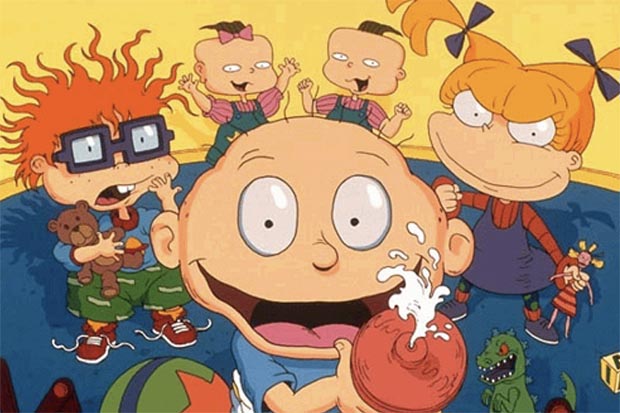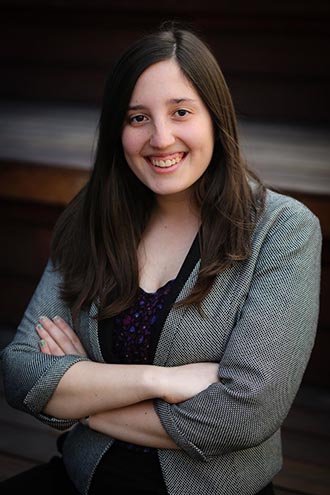Remembering ‘The Rugrats’ Hanukkah episode
Teri McGuire, MA'16, wrote her master's thesis on the impact 'The Rugrats' had on Jewish children. Unsurprisingly, the Hanukkah-themed episode holds a special place.

A still image of 'The Rugrats' characters
“A Macca-baby’s gotta do what a Macca-baby’s gotta do.”
Children who grew up in the 1990s remember the beloved quote from the Hanukkah-themed episode in the hit Nickelodeon animated series about talking babies, “The Rugrats.”
Teri McGuire, MA’16, is one of millions who grew up on the show. However, she took her love and interest in “The Rugrats” to the next level by making the series the primary focus of her master’s thesis, “Don’t Close the … Door: ‘Rugrats’ and its Impact on Jewish Children.
McGuire, a native of Rockland County, New York, presented the thesis to the Hornstein Jewish Professional Leadership Program and the Department of Near Eastern and Judaic Studies.
Protagonist Tommy Pickles delivered the Macca-baby statement during “A Rugrats Chanukah.” In the episode, Tommy and his friends learn about Hanukkah from his intermarried family; parts of the episode even feature the babies acting out the Hanukkah story.
“The Rugrats” – and the Hanukkah episode in particular – have had a lasting impact on millennials, particularly Jews. McGuire spoke to BrandeisNOW about why.

Teri McGuire
What inspired you to examine “The Rugrats” in your master’s thesis?
The basis for the thesis was me sort of doing a study on myself — I grew up in an interfaith family and we were very active in the conservative movement of Judaism. My family was actively involved in our synagogue, but I also noticed that many of the other families didn’t look like my family at all. There were implications to this that the show captured — the Pickle’s family in “Rugrats” looked like mine. When I was at Hornstein, I wanted to explore this more and see if the show resonated with other young people who are Jewish — were there any childhood themes about being Jewish in 1990s America?
How significant was the Hanukkah episode in American television at the time?
Actually, the most important religious episode on the series was dedicated to Passover. In short, the creators, many of whom were Jewish or had strong ties to Judaism, were asked by Nickelodeon to make episodes based on Jewish themes, as there had been small clues here and there that the Pickles family was Jewish. But the creators weren’t ready to have a Hanukkah episode because they felt it was more complicated to showcase as a holiday that was already pretty mainstream in media, as well as a holiday that gets a lot of attention, but actually isn’t the most important holiday to the Jewish people.
Instead, they decided to tackle Passover, an important festival in the Jewish calendar which received less attention. The implications of this are significant. If you were, say, a kid in rural Alabama who watched the show at a young age and had [“Rugrats”] dolls and toys, and had seen the movies but you had never encountered a Jew before, seeing these episodes with Jewish holiday themes allowed you to learn the stories of Passover and Hanukkah for the first time.
How did the creators manage to find a way to show a Hanukkah-themed episode during the holidays, when television is typically focused on Christmas themes?
Christmas plays a significant part in the Hanukkah episode. However, there are very few Christmas-themed shows and movies for children that tell the story of the birth of Jesus — they’re mostly about Santa Claus, presents, reindeer, snow and so on. Everyone knows the story of Christmas. Hanukkah isn’t as mainstream. In the Hanukkah episode, there is an ongoing theme about the “miracle of Hanukkah.” The show talks about the miracle in light of American culture, though Christmas somehow keeps getting brought up. This is very intentional, as young, Jewish children growing up in America can’t avoid Christmas. In that way, the episode teaches children that it’s OK and cool to be unique and different — in fact, it’s worth celebrating.
How did Nickelodeon encourage “Rugrats’” creators to feature Judaism in the series?
Nick was specifically the first network exclusively for kids, period. It wasn’t ahead of its time, but it was willing to be honest. Other networks like ABC and NBC would provide programming for children and if it worked well in terms of ratings that was that. Meanwhile, Nick wanted to cast as wide a net as possible and prioritized diversity. It didn’t always work, but most of the time it did.
Two of the creators and animators of “Rugrats” were Jewish and another was married to a Jew. Nickelodeon encouraged the creators to talk about Judaism in their episodes and they did, though the writers and creators did sometimes backlash. They wanted to discuss these themes correctly, which is why they chose to air an episode about Passover first before going into Hanukkah, a complicated holiday in a nuanced winter season.
Looking back, are there other aspects of the Hanukkah episode you wish you had explored?
There are two things. One is that the end of my thesis directly mentions a quote from the end of the episode which says the Menorah is the night light of the Jewish people. When I wrote the thesis I loved that line because it was a great thought about being yourself, and being safe by the light. However, 2018 rings different in light of the recent rise in anti-Semitism; being safe means something different now, especially in terms of putting a Menorah in our window for others to see.
Second, the series does a good job of using buzzwords like “tradition” — it’s a word Jews say over and over, and it’s very “Fiddler on the Roof,” and it’s sort of an insider situation where the writers were playing to the audience. Using those buzzwords can make Jews the insiders to an episode while also showcasing Jewish themes to the world. There are layers to the show, even though children were the target audience. I would watch “Rugrats” with my parents, who were in their 30s at the time the show aired, and they enjoyed it. I think it speaks volumes that so many people find meaning in it.
Categories: Alumni, General, Research, Student Life





